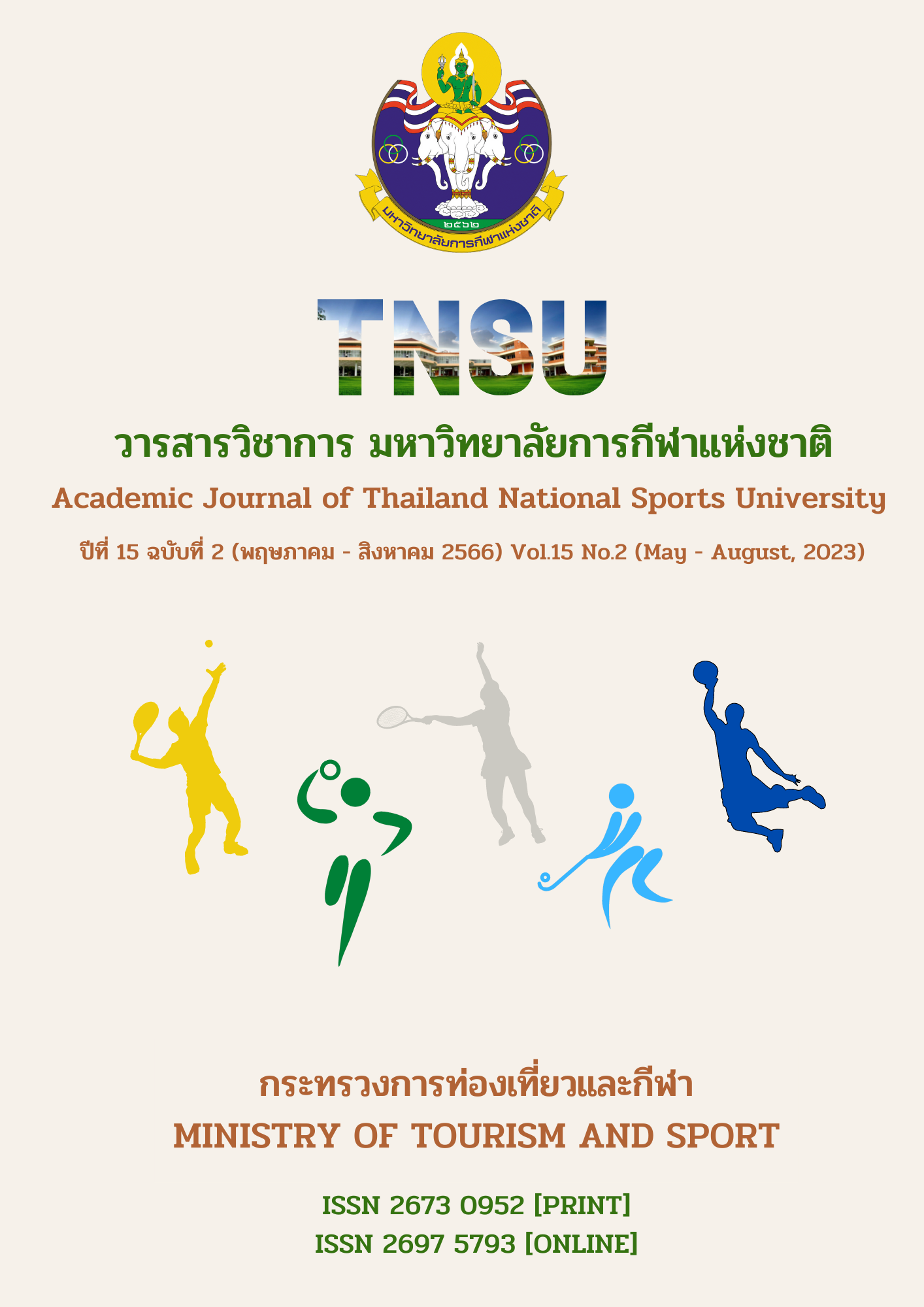MENTAL FITNESS PROMOTION PROGRAM USING SOCIAL SUPPORT AND SOCIAL NETWORKING FOR UNDERGRADUATE STUDENTS
Main Article Content
Abstract
Purposes: 1) To compare the mean scores of mental fitness before and after the experiment of the students in the experimental group who received the mental performance promotion program using social support and social networks, and those of the control students who did not receive the mental performance promotion program using social support and social networks, 2) To compare the mean scores of mental fitness after the experiment between the experimental group and the control group. Method: The samples consisted of 50 undergraduate students, divided into 2 groups with a matching method, 25 students in the experimental group and 25 students in the control group. The research instruments were the mental fitness promotion program using social support and social networking consisting of 10 activities 1) Mondays are better combined 2) Being optimistic 3) Talking and listening 4) Your strengths 5) Your body matters. 6) Set goals towards the finish line 7) Know how to help 8) Forgive and thank you 9) Set your mind and 10) Review changes with an IOC of 0.94 and the data collection instruments included a rating scale mental fitness measure and a situational mental fitness measure with IOC of 0.95 and 0.92, with a reliability of 0.81, respectively. The duration of the research was 8 weeks, 2 days a week, 50 minutes a day. The data were analyzed by using mean, standard deviation and t - test. Results: The research findings were as follows: 1) The mean scores of mental fitness of the experimental group were significantly higher than before the experiment at the .05 level. 2) The mean scores of mental fitness of the experiment group after the experiment were significantly higher than that of the control group at the .05 level. Conclusion: Mental fitness promotion program using social support and social networks affects the mental fitness of graduate students.
Article Details

This work is licensed under a Creative Commons Attribution-NonCommercial-NoDerivatives 4.0 International License.
The published article is a copyright of the Academic Journal of Thailand National Sports University. The passage appeared in each article in this academic journal is a perspective of each author which is not related to the journal. Each author is required to be responsible for all components of his/her own article. If there are any mistakes, each author must be responsible for those mistakes on his/her own.
References
Adcharaphan Wongnoi, Patcharin Nintachan & Sopin Sangon. (2021). The relationships of resilience, practical problems on the ward and social support to stress among nursing students. The Journal of Psychiatric Nursing and Mental Health, 35(2), 73 - 94.
BBC NEWS Thai. (2019). Suicide: Experts worry about plagiarism after media reports more students commit suicide. Retrieved from https://www.bbc.com/thai/thailand-47944055
Department of Mental Health. (2018). World Suicide Prevention Day. Retrieved from https://www.dmh.go.th/news/view.asp?id=1231
Department of Mental Health (2020). Department of mental health reveals that Thai teenagers consult “Stress problems” the most. Suggest techniques to manage stress. Retrieved from https://www.dmh.go.th/news-dmh/view.asp?id=30188
Department of Mental Health. (2021a). Indicating that if online learning is not ready, there may be an increased risk of mental health problems. Retrieved from https://www.dmh.go.th/covid19/news2/view.asp?id=52
Department of Mental Health. (2021b). Thai Mental Health Indicator version 2007: TMHI-55. Retrieved from https://dmh.go.th/test/thaihapnew/thi54.asp
Furber Gareth. (2018). Let’s talk mental fitness. Student health and wellbeing. Retrieved from https://blogs.flinders.edu.au/student-health-and-well-being/2018/04/06/lets-talk-mental-fitness/
House, J. S. (1987). Social support and social structure. Sociological Forum, 2(1), 135 - 146. Retrieved from shorturl.asia/i9ThK
Kang, S. J., Ko, S. H., Kim, J. Y., & Kim, S. R. (2020). Effects of a mental fitness positive psychology intervention program on inpatients with schizophrenia in South Korea: A feasibility study. Perspectives in Psychiatric Care, 56(1), 6 - 13. Retrieved from https://doi.org/10.1111/ppc.12332.
Marin & Wellman. (2016). Social network analysis: An introduction, In John Scott & Peter J. Carrington. The SAGE Handbook of Social Network Analysis. Retrieved from https://dx.doi.org/10.4135/9781446294413
Nopakao ChantasirikulSocial, & Supanee Sontirat. (2020). Skill, social support and loneliness of the second year students at the faculty of engineering, Kasetsart University, Bangkhen Campus. The 15th RSU National Graduate Research Conference. Retrieved from https://rsujournals.rsu.ac.th/index.php/rgrc/article/view/1856
Office of The Higher Education Commission. (2020). Number of higher education students at undergraduate degree level in the formal school system by Jurisdiction: Academic Year 2020. Retrieved from http://statbbi.nso.go.th/staticreport/page/ sector/th/03.aspx
Parinya Siriattakul. (2014). A confirmatory factor analysis for mental health of adolescents in eastern region, Thailand. Interdisciplinary Research Journal: Graduate Studies Edition, 3(2). Retrieved from https://so03.tci-thaijo.org/index.php/JIRGS/article/view/227377/154972
Phamornpun yurayat. (2011). Education and development of mental well - being of university students (Master's thesis), Srinakharinwirot University. Retrieved from http://ir.swu.ac.th/jspui/handle/123456789/2398
Piyawan Visessuvanapoom. (2019). Understanding depression in adolescents. Retrieved from https://www.chula.ac.th/cuinside/17693/
Pongsathorn Putongkum & Ngamlamai Piolueang. (2019). Elf concept, family function, social support and integrity of Kasetsart University students, Bangkhen Campus. Journal of Industrial Education, 18(3), 272 - 280.
Robinson, P., Oades, L., & Caputi, P. (2015). Conceptualizing and measuring mental fitness: A Delphi study. International Journal of Wellbeing, 5(1), 53 - 73. doi:10.5502/ijw.v5i1.4
Thai Health Promotion Foundation. (2020). Thai health watch 2020. Retrieved from http://surl.li/bxirv
Thakorn Chaisathaporn. (2017). The guidelines to create a social network a case study of the bilateral to enhance the quality of Thai labors. Retrieved from http://www.dsdw2016.dsdw.go.th/doc_pr/ndc_2560-2561/PDF/8388s/%E0%B8% A3%E0%B8%A7%E0%B8%A1.pdf
Thanarin Harnkiattiwong, Rujikarn Sanont, & Nitiphat Kittirakshakula. (2021). Social network and health promotion. Social Science Journal of Prachachuen Research Network, 3(1), 58 - 68. Retrieved from https://so03.tci-thaijo.org/index.php/prn/article/view/ 250863/168866
World Health Organization. (2020). Mental health. Retrieved from https://www.who.int/ health-topics/mental-health#tab=tab_1


